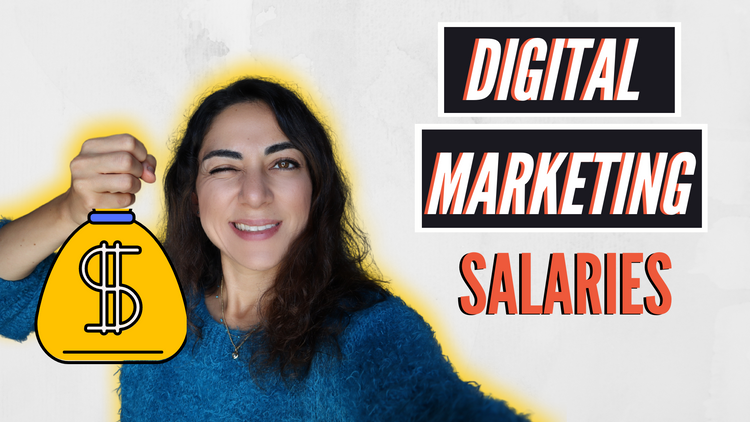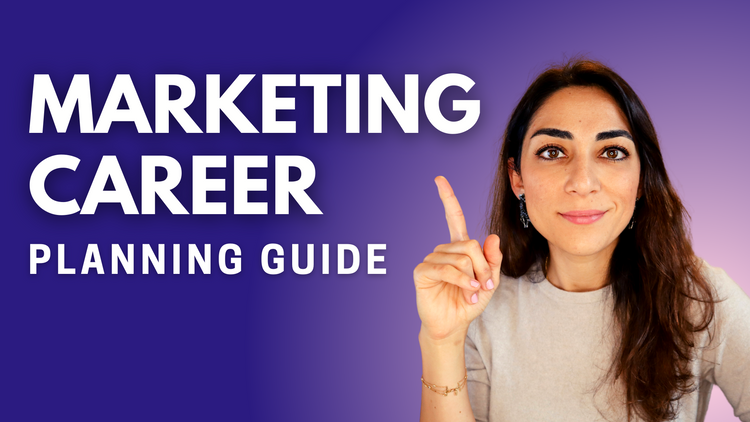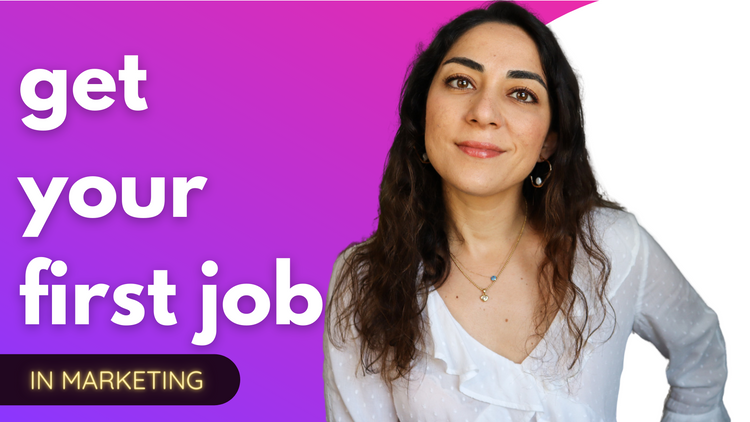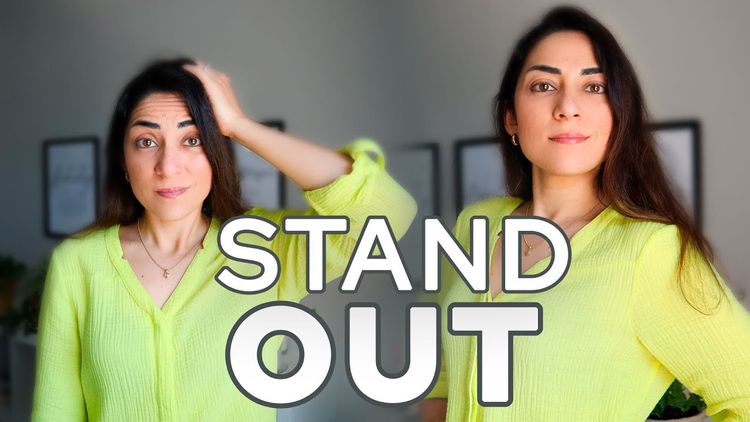How to Prepare for a Marketing Interview [Questions + Answers]
![How to Prepare for a Marketing Interview [Questions + Answers]](/content/images/size/w960/wordpress/2021/07/Elif_MarketingInterviewQuestions.png)
You’ve gone through the stress of creating your resume, your cover letter, doing the applications, and now, finally, you have an opportunity to do an interview.
What does this mean for you?
An interview is as much of an opportunity for you to introduce yourself, as it is for you to learn more about the role, and to see if the opportunity and company is actually a good fit for you.
In this blog, we’ll be going over how you can ace your marketing job interview for generalist marketing roles.
We’ll discuss how to prepare for an interview, common questions, and how following up can help you stand out from other potential candidates so you can land your dream digital marketing job.
If you’d prefer to listen or watch me go through how to prepare for your interview, feel free to watch the video and pause as needed
Jump Ahead
- Preparing for a Marketing Interview
- Marketing Interview Questions and Answers
- Following up after an Interview

Preparing for a Marketing Interview
1. Study the role
Let’s break it down. The first thing you need to do to prepare for an interview is study the role.
This means looking specifically at the:
- Keywords
- Role description
- Responsibilities mentioned in the job description (JD) you’re preparing for.
Chances are when you were applying to this particular job you reviewed the JD. Perhaps you even highlighted relevant bits of information. But now, I want you to go through that JD once more, and pay particular attention to the language and keywords used.
Why?
Because I want you to get familiar with the terms used, so you can match how you talk about your skills and experience using those keywords.
Is there anything that they’re specifically looking for that you can speak to?
Highlight it. While you’re at it, write down how your past experience relates so that when you’re in front of your interviewer(s), you’ll have it at the forefront of your mind, and ready to go when appropriate.
2. Study the company
The second thing you need to do when preparing for an interview is study the company.
This means:
- Explore your company’s official website
- Read the news
- Find out who their competition is
- Browse through their official LinkedIn page and socials
- Research the people who work there (including your interviewer(s) and potential co-workers).
I want you to digitally stalk the company.
Digitally stalking your company might sound like a weird suggestion, but in doing so, I promise you’ll learn a lot.
For instance, you might learn about the size of the team and how they create posts about the company they’re working for which might then give you a pretty good sense of how the current workers value the company and a rough idea of whether or not it’ll be a good match for you ahead of the interview.
So read the news, find out about their competition, be knowledgeable about the industry that company is in and how that company is performing within its niche.
3. Do a marketing audit
So now that you’ve digitally stalked your company and learned a bit about them, I want you to take the sleuthing a step further by doing a marketing audit.
What’s a marketing audit?
I’ve covered how to conduct a content audit so you can prepare for a marketing job right here, so be sure to check out the video if you want a more in depth review.
A marketing audit as described by Kotler and Keller (1989) is a “comprehensive, systematic, independent, and periodic examination of a company’s—or business unit’s—marketing environment, objectives, strategies, and activities with a view to determining problem areas and opportunities and recommending a plan of action to improve the company’s marketing performance.”
I never go into an interview without doing a marketing audit and neither should you if you really want to stand out and impress your dream company.
Things you should look for in a marketing audit
With a marketing audit, you’re looking to see if there’s any suggestion or contribution that you can make to fill that gap that you see in their processes and systems.
Some high level things you should look at during your audit include:
- types of posts published by the company
- platforms used
- their website
- their emails
- their lead generation systems
- their content types
Once you’ve done your marketing audit you should be able to answer the following:
- what is the company good at?
- what are their successes?
- what are the gaps in their processes and systems?
Remember to share your insights with your interviewer(s) as it’ll definitely give you bonus marks. But, if you end up running out of time, you can always leave it for after you’re hired and you still want to impress the team.

Marketing Interview Questions and Answers
Aside from conducting research on your company, you’re going to want to prepare for interview questions you’ll get from your interviewer(s). Here are some typical questions.
1. Tell us about yourself
One of the most commonly asked questions in interviews is “tell us about yourself”.
For this particular question, you’re going to want to prepare in advance with an elevator pitch.
Have a few concise sentences prepared in your mind about how you want to communicate your experiences and position yourself.
Think of it in a way as a mission statement or linkedin biothat you want to present to your interviewer(s).
Your elevator pitch is also where you’ll want to integrate the language and keywords that you studied in the JD earlier on while preparing.
Here’s a good example of an elevator pitch for entry level positions and more resources that might help you craft your short response to one of the most commonly asked questions.
2. Why Us?
You could have applied to a dozen other roles and companies, but interviewers often want to know why this one in particular?
Other variations of this question might be “why this role?” or “what makes you a good fit? “
In order to answer the question “why us” confidently, you’ll have to ask yourself: why are you passionate about this company?
Are you passionate about this company?
You also want to have done some research about the company so you can identify with some of the key points.
Maybe you really like their culture, or you’re interested in the growth opportunities.
Perhaps you’re interested in that industry or a specific product that they’ve launched.
Whatever it is, know why.
3. Failures and successes – tell us about a failure
Another very commonly asked question is “tell us about a time when you failed as a marketing team or individually”.
What interviewers want to know by asking this question is your attitude towards things when things go wrong.
Are you capable of taking action, and arriving at an appropriate resolution in challenging situations?
The general expectation is to hear you identify the problem, that your reaction wasn’t all negative and dramatic, and that you realize what had to be done.
For behavioural questions like this, a tip from HR professionals is to approach it using the STAR technique .
What is the STAR technique when interviewing?
The STAR technique or STAR method is a structured approach to responding to behavioral-based interview questions by discussing the Situation, Task, Action and Result of a scenario that you are asked to describe.
- Situation: What is going on, why it’s failing – identify the situation you’re in.
- Task: Determine what has to be done, or what you did in the situation you were in.
- Action: What action did you take to improve or to change the situation you were in.
- Result: Moving forward, what will you or did you learn to do differently? Were you able to turn things around, what was the result of that failure?
4. Failures and successes – tell us about your biggest success
In addition to being asked to discuss your failures, interviewers will often ask the question “tell us about the biggest success you’ve had in your career so far”.
Here, you’re expected to talk about something you’re proud of.
It’s likely that you have multiple successes to draw from, think of a couple of relevant examples you can bring to the table and have them ready to go.
5. Tell us about a situation where you were faced with a problem and how you resolved it
Sometimes this question is specifically asked in terms of a disagreement with a team/within the team, or with a client and how you resolved this but it is different from the earlier “tell us about a failure” question earlier.
The purpose of this question specifically is to see your approach to problem solving when faced with a problem.
In other words, your interviewer(s) want to know:
(1) how solution oriented you are when you’re in an environment of disagreement;
(2) what are the steps that you’d take to resolve a situation at hand.
Do you make a scene? Or are you level-headed and able to get the job done despite existing circumstances.
Remember to think this question through, and answer it in a way that completely answers the question. Your response should also be different to the “tell us about a failure” example provided earlier.
6. Strengths and weaknesses – tell me about a strength and weakness
You’re absolutely going to have to talk about your strengths and weaknesses one way or another in your interview. So be prepared.
Part 1 – “Tell me about a strength”
Think about strengths that are relevant to the role you’re interviewing for.
Example of a strength: Working well alone and with minimum supervision.
If you’re interviewing for a 100% remote role during the pandemic, your strength might be that you work really well with minimum supervision and individually.
This example is perfect because it is relevant to the role and current circumstances.
Alternatively, it could be something else but think about something relevant.
Part 2 – “Tell me about a weakness”
Same goes for your weakness, don’t pick something that’s irrelevant, like “my weakness is that I’m a very picky eater” because this has nothing to do with your career.
When discussing a weakness, pick something that is both relevant AND somethingthat you’re able to elaborate with concrete steps you have taken to improve upon those weaknesses.
Example of a weakness: Being a multitasker
A weakness could be that you’re a multitasker and the disadvantage of multitasking may be that you work simultaneously on different things. And this in the past has shown you that you may sometimes miss out on deadlines. And after realizing this, maybe you took XYZ actions and this resulted in XYZ results.
7. What marketing technology you use – tell us about the marketing technology you’ve used and are familiar with
This is another great question for marketing roles. If I was interviewing, I would absolutely ask this question.
With this one, you want to be as specific as you can.
If you’ve used a marketing tool, tell your interviewer what the tool is, for what purpose, in what setting, and at what capacity.
If there’s a certification or course you took or are currently taking, maybe talk about it.
Perhaps you’re very interested in learning how to use Marketo, and you’re halfway through the certification program that Marketo has.
Or maybe you’ve worked with Databox in the past and loved it, and think that it could benefit the current place you’re interviewing with as it might help them save time and improve the customer satisfaction when it comes to client reporting – mention it.
Quick tip
Whenever I talk about the technology that I’m familiar with, I always follow up by asking them what they currently use, and what their tech stack looks like. Doing this helps me assess whether there are any MarTech Tools that I will need to learn about ahead of time and informs my 30-60-90 day plan.
What’s a 30-60-90 day plan?
Very briefly, a 30-60-90 day plan is a plan that lays out your intentions for the first 30, 60 and 90 days of your job to ensure your success once you’re hired.
The timeline can be greater than 30-60-90 days, but I won’t go into details here.
But if you did want to know what to do in your first 90 days of your marketing job or get inspired, here’s a video which you can bookmark and save for later.
8.Why do you want to leave your current job
If you’re currently at a job, often interviewers will ask why you want to leave it for theirs.
Have a short answer ready to go, and avoid speaking negatively about your previous place (and yourself) as it could raise some red flags and suspicion, even if that’s not what you intended to do.
9.Salary expectations
Do you know what to say when your interviewer asks you about your salary expectations?
You should, and if not, this is a question you need to prepare for.
Do your research. Visit Glassdoor, LinkedIn, and explore average salaries in the city that this company is based in because you don’t want to say something and then regret it because you aimed too low, or even lose a job opportunity because of a very high unrealistic expectation.
Come up with a reasonable and realistic salary expectation, don’t sell yourself short, but also don’t over shoot yourself.
Here’s a video if you need help coming up with your salary expectation.
10. Have your questions ready for your interviewers
At the end of your interview, you’re typically given some time to ask the interviewer some questions. Always have questions ready.
If you need a set of proven questions that will position you as a high value candidate, access my marketing & career resources here.
In addition to these, I suggest you draft a few customized questions drawn from your research of the company and audit that will show your knowledge, interest and fit for the role.
What types of questions could you ask?
Maybe you read in the news that the company you’re interviewing with was recently acquired by another company.
Ask what this will mean for the organization.
What are some changes that this new milestone for the company might reflect on the marketing team?
This is going to show that you did your research, you’re reading the news about the company and you’re aware that this could likely impact the marketing team and the organization’s structure.
If you’ve identified some gaps with the campaigns and tools the company is using from having conducted your website/content audit, bring this up, and then use it as an opportunity to ask about the tools the company currently uses.
Another example of a question you can ask might be “what are some major marketing events or product launches that are coming up this year or this quarter”.
These are just to get you inspired, but I highly suggest you review the extensive list of questions and create a copy for yourself. And always remember, an interview is a two-way conversation and this is also YOUR opportunity to assess whether the company is a good fit for you.

Following Up After an Interview
Last but not least, follow ups. You’d be surprised how many people end an interview process without sending a follow-up email but I’m mentioning it here because I do not want you to skip this game changing step.
Once you’re done with an interview you should always send a follow-up email to the interviewer within a few hours.
Follow-up emails are the perfect opportunity to thank interviewers for their time and show them that you’re excited about the potential opportunity.
In addition, it’s also a great way to remind them about the conversation you had, and can be an added opportunity for you to add something valuable to the conversation.
My tactic with the follow up email is:
- Thank the interviewer for their time
- Add a personal note – maybe a question that I had remaining from the interview, maybe something that I remembered later on that I didn’t mention in the interview
- Add something else to that conversation – maybe we talked about a movie that they really liked, or I wanted to suggest something to them or I wanted to share a link to follow up with an example that I mentioned talked about during the conversation.
In essence, you want to always add a thank you note and a personal note or a question.
Remember to keep it short and end it on a positive note.
Final Thoughts
Whether you’re applying for a generalist digital marketing role or a more specialized role, facing a marketing interview consists of three main steps: the preparation, the interview, and the follow up.
In the preparation phase, you’ll want to study the role, the company, and conduct an audit.
In the interviewing phase you’ll want to have an elevator pitch ready to go, prepared for common questions, practised behavioral questions, and have questions for your interviewer that will help demonstrate your enthusiasm and knowledge.
Then, once you’re done with your interview, you should always remember to thank your interviewer, and end on a positive note.
Need more in depth marketing job interview crash course?
Preparation is half the victory, what you need is a system.
3 Ways I Can Help You When You're Ready
1. Be a better marketer with the resources I created, including a kickass course to help you land your dream marketing job, templates and lists of resources to accelerate your learning.
2. Work 1:1 with me to define your career roadmap and get support for your marketing job application process.
3. Get in touch to join Superside, Integromat, Whatagraph and many others to promote your brand or business through partnered content on YouTube and other social media platforms to an audience of self-learner marketers!





